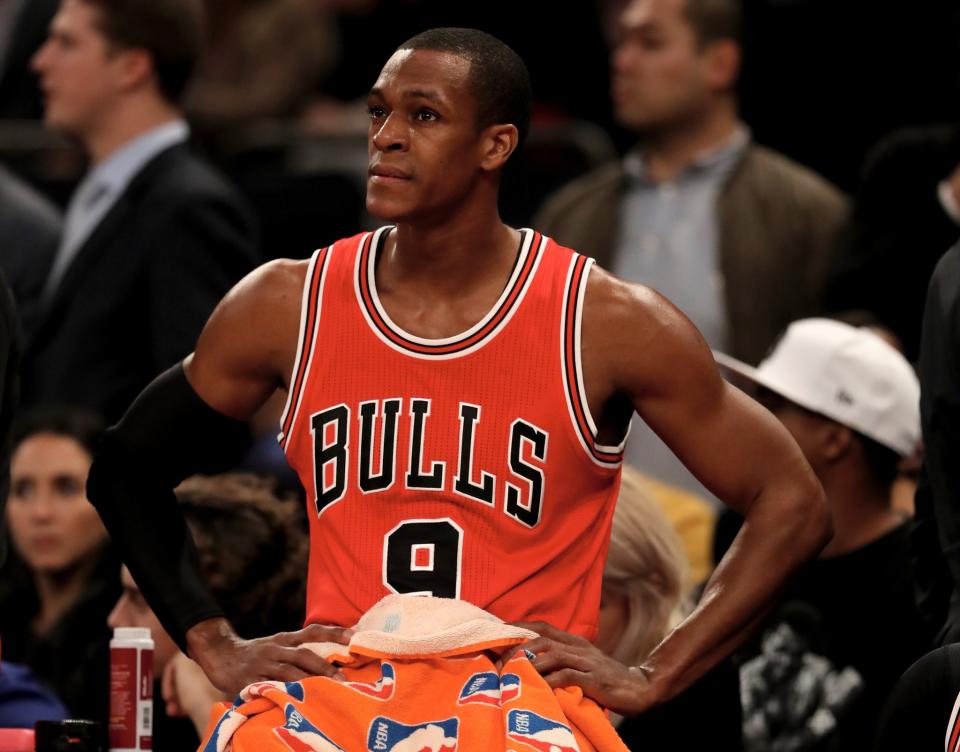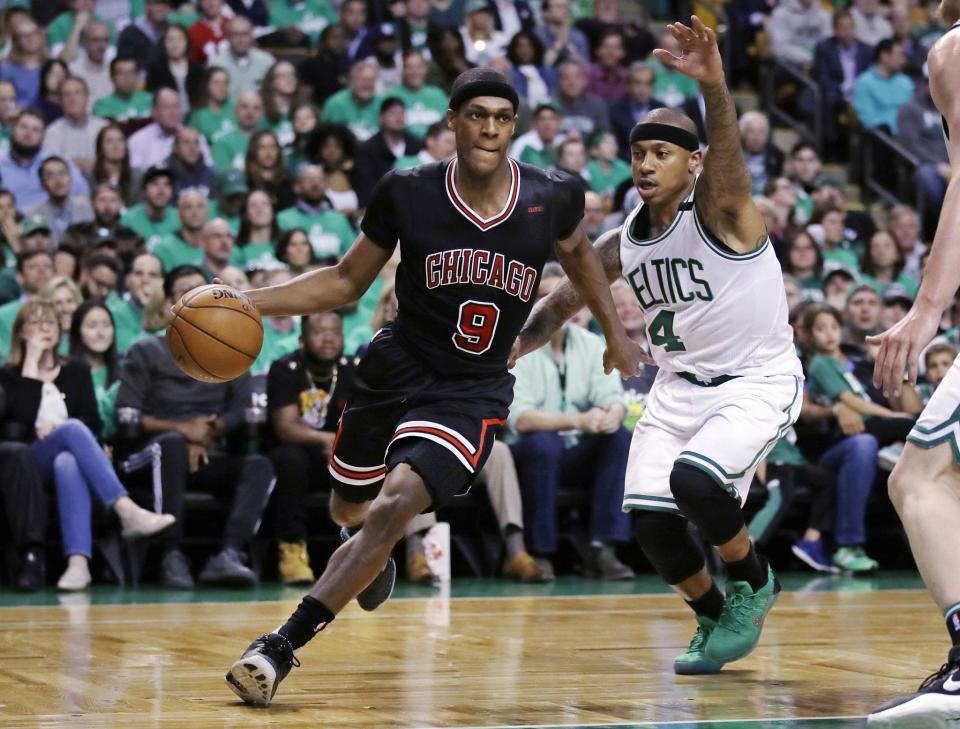Inside Rajon Rondo's unexpected, up-and-down late-career journey
BOSTON – To Rajon Rondo, the feeling of the first two games of the Bulls-Celtics series was familiar. The floor, the green painted parquet he had zipped up and down thousands of times. The role, starting point guard on a veteran team, a floor general flirting with triple-doubles every night. The position, up 2-0 in a first-round series with an opportunity to close it out with two games at home.
Simple, right? For Rondo, it’s been anything but. It’s been two and a half years since Boston traded Rondo, the last remnant of the Celtics’ championship core. To call that time difficult would be an understatement. A disastrous, 46-game stint in Dallas ended with Rondo banished two games into the playoffs. He led the NBA in assists with the Kings the next season – but was told by point-guard starved Sacramento at the end of it that it was moving on. The Bulls picked him up, and after an uneven season Rondo emerged as a force in the playoffs – before breaking his right thumb in Game 2, an injury that will keep him in a cast for the next 7 to 10 days.
Chicago was one of the few teams to make Rondo an offer last summer. He started for two months. He was benched in January. By February, Rondo was on every list of potential buyout candidates. “If you had asked me in February where Rondo would be playing next season,” a rival general manager told The Vertical, “I would have said the Shanghai Sharks.”
Understanding Rondo’s fall isn’t difficult – if you know Rondo. Dallas believed it was getting the missing piece to a title-winning puzzle. It didn’t account for a personality clash between a stubborn player and a headstrong coach. The battles between Rondo and Rick Carlisle seemed almost nightly. Rondo was defiant, brazenly ignoring instructions, chafing under his heavy-handed coach. That irked Carlisle – who let Rondo know it. A publicized late-February confrontation in the locker room was instigated by Carlisle, two people with direct knowledge of the incident told The Vertical, who was irate at Rondo’s pushback to the play-calling. Within months, it was apparent the marriage between Rondo and the Mavs wouldn’t work.
Sacramento proved even more toxic. Rondo’s numbers were good – 11.9 points, 11.7 assists, a career-best 36.5 percent from three-point range – but his relationship with his coaches again soured. Team officials described Rondo as selfish, willing to pass only if he thought it would lead to an assist. He would hijack shootarounds, team sources told The Vertical, change game plans out of timeouts and fought against guarding opposing point guards, preferring to stay out of pick-and-roll situations in favor of being able to roam and look for steals.
Yet if coaches saw one player, teammates claim they saw one totally different. “Rondo doesn’t get enough credit,” Caron Butler, a teammate in Sacramento, told The Vertical. “Obviously there are some things out there from when he clashed with coach Carlisle. Maybe he was tough to play with. I witnessed something totally different. Watching him in Sacramento last year, watching him take Ben McLemore to the gym, watching him watch film with DeMarcus Cousins, letting him know where to be, where the double-teams were coming from. Taking over the film sessions. He’s a great thinker. He loves the game. He takes great care of his body. He takes his craft seriously. He was honest. That’s what you appreciate in a basketball player.”
No question, Rondo is intelligent. Bulls coach Fred Hoiberg says the point guard has as high of a basketball IQ as any player he has ever known. On the court, that’s an asset. Off the court, his unshakeable belief in his read of situations can cause friction. “The one thing Rondo knows is the game,” Doc Rivers, who coached Rondo in Boston, told The Vertical. “He gets himself in trouble at times because he will debate things with anyone. To me, that’s partly good and bad. There were days I would tell him, ‘You got to fight for that,’ and there are days that you have to be quiet. I remember him asking me which ones were which, and I told him he had to figure it out on his own.”
Chicago seemed to be Rondo’s last stand. Yet again, things went south quickly. He clashed with Hoiberg, remarking in March that he wanted to play for “a straightforward coach.” A locker room altercation with assistant coach Jim Boylan earned Rondo a one-game suspension. Management’s decision to prioritize the development of the Bulls’ young players midseason bothered him. He fell out of the rotation. At 31, Rondo’s NBA career was on life support.
Then, the unexpected. Rondo hung around. He didn’t sulk. He was supportive. “I remember watching him,” Rivers said. “And after those first couple of games [on the bench], he was so positive. You could see him on the sideline, cheering his guys on.”
Rondo connected with the Bulls’ young players. He became a mentor to them. And he worked. When Jerian Grant and Michael Carter-Williams struggled, Hoiberg returned Rondo to the rotation. In mid-March, he was back in the starting lineup. In an effort to salvage the season, Hoiberg decided to push the pace. Rondo was the ideal player to do it.
“He’s been as responsible as anybody for turning our season around,” Hoiberg told The Vertical. “He injected a pace and energy into our starting lineup that we desperately needed. I’m so pleased with how he handled everything he has gone through this season. From being out of the rotation to coming back [as a reserve] and taking pride in that role as a leader of that second group to getting back into that starting lineup. He’s been great.”
Rondo admits to feeling some basketball whiplash since leaving Boston. This season with the Bulls has been among his toughest. “It’s up there,” Rondo said. “My first year [with Boston in 2006-07], we lost 18 straight. You doubt if you even belong in the NBA. The team was so bad, and I wasn’t even playing a lot. That was a tough year as well.” Sacramento and Dallas, he says, were not as difficult. “I don’t really think I went through that much,” Rondo said. “I had some great times, met a lot of great new teammates. The league is like a brotherhood. I played with a lot of different players. You learn from each process. You meet a lot of great players and people from different organizations.”
To stay positive in Chicago, Rondo reached out to old friends. Kevin Garnett got a few calls. Keyon Dooling, too. His high school coach, Doug Bibby, was a frequent resource. He remembered the impact Boston’s veterans had on him. And he resolved to do the same with the Bulls.
“I knew I was putting my head in the right direction trying to lead these young guys in whatever way I needed to,” Rondo said. “I remember when I was a younger cat. I always thought the veteran guys talked too much. I don’t always want to be the guy who is talking, but when [young players] ask questions I always try to give my best advice. Not just talking, I try to lead by example.”
Rondo has salvaged the Bulls’ season. Perhaps his career, too. This latest injury is just one more setback for him to overcome. The Bulls can buy out Rondo’s contract next summer for $3 million. Rondo hopes they don’t. “I feel organizations have to give guys time to grow and learn each other,” Rondo said. “Everyone is not going to be San Antonio, but for me I think you should always keep your guys together as long as possible so you can develop chemistry.”
If the Bulls part ways, Rondo will move on. He knows his reputation. He believes this season has changed it. “Each year you grow,” Rondo said. “I try to wake up each year, each day, and be a better version of me. The older you are, the more mature you act, the wiser you become.”
For now his focus is on Boston, and doing what he can from the sidelines to help his teammates topple a franchise he helped rebuild into an NBA champion.
For three years, Rondo’s career has spiraled. The ACL injury that robbed him of one last playoff run with Garnett and Paul Pierce, the trade to Dallas, the messy season in Sacramento. Nothing has gone as planned. But the last two months have offered new hope. The book on Rondo has many chapters. A few more may yet be written.
Popular video from The Vertical:




